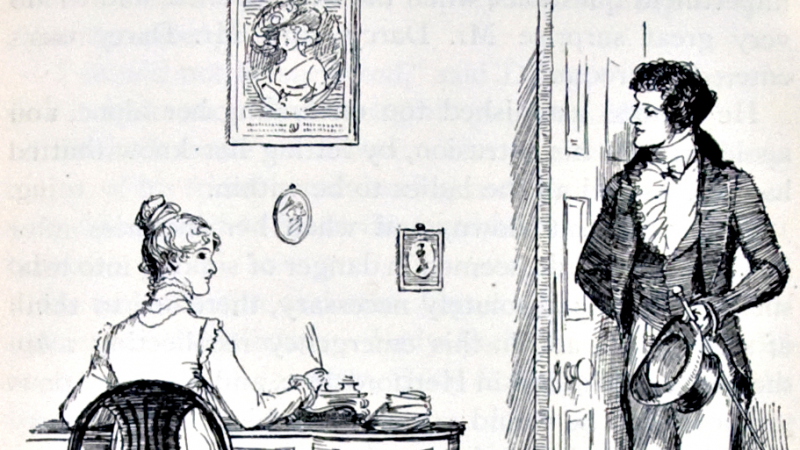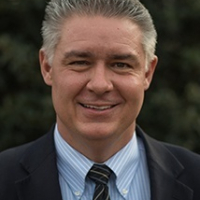Tour of Omnibus Series: Novels and Pride and Prejudice

I grew up in a storytelling family and was blessed to have a close relationship with my Grandmother, Mary Martha Ranes, or “Gran” to family members. When I was little she would delight me with stories about the old times, stories about trials and triumphs in our family, and fictional stories that she would make up about cowboys. As I grew older, she would tell the same stories over and over. At points, I am not sure where stories end and storytelling begins, but I delighted in hearing the stories of how my great-grandparents met because of the charity of one family that supplied food for another family who had just made the trip back to Southern Indiana from Wolf City, Texas in covered wagons. I still grin thinking about the story of the frustrated undertaker who punched the coroner of our small town. When the coroner took the undertaker to court, the judge fined the undertaker $25. Hearing this, the undertaker promptly handed the judge $50 and punched the poor coroner again.
God speaks to us in His Word in many ways and uses many different types of literature to help us understand Him. It is telling, however, that much of what we read in the Old Testament history and the New Testament Gospels and History is both true history and intriguing stories.
So, why do we read stories or novels in Omnibus? In stories we come to know ourselves, others, our places, and our world in ways that we could not without them. In stories, we can delight in creation mimicking God’s work and Word. Novels hold the possibility of bringing us into the lives of characters and even help us make new “friends.”
Novels help us know ourselves, others, our place, and our world more fully
Stories are an examination of the experiences of others. These others could be real living people, those who have died, or fictional characters. In all cases, the good storyteller or novelist is bringing us into a kind of communion with the character. Through this communion, we can know the character, but also know ourselves in a new and deeper way.
One of the best novelists is Jane Austen and her book Pride and Prejudice can help us see the power of the novel. Her books are set within her own experience, that of the English nobility of the late 18th and early 19th century. Her characters are delightful and rich. Elizabeth Bennet is the central character of Pride and Prejudice. As we view her experiences and her virtues, it is hard not to like Lizzy. She is loyal, witty, forthright, and strong. We also discover that she has made some wrong judgments about other crucial characters in the book. Through Elizabeth, we learn to temper our own judgments and to question assumptions that we might make in a hasty manner about others.
Novels also help us know places well. Austen introduces us to rural England and the small hamlets of her time. Loving places is an important part of life and Austen’s thoughtful descriptions of her surroundings make a reader long for those simpler times in rural England.
Novels Mimic the Creator
As I mentioned, God tells us about His commitment to His people through stories. Novels allow authors to create their own world in a way that is analogous to God’s creation of this world. Of course, we are not God or gods. We can not, like the Creator, make things ex nihilo (out of nothing). We are made in the image of God and because we bear that image God calls on us to do things as He does. When we create works of art or beautiful music, we mimic the Creator.
Novels are a powerful way to be like God. When an author creates a story, they both have to borrow from God’s creation and they are in a sense making a new world. When Austen creates Longbourn, the Bennet’s home, or when one visits Pemberly, Austen brings this world to life in the imagination of the reader. God’s children are called to be like Him and in exploring these created worlds we are invited to enjoy authors who are doing the work of world building.
Novels Instruct Us
Stories teach. When we read about David fleeing from Saul or sinning with Bathsheeba, we can learn how to hate sin or how to trust God. When we see, with a shocked Elizabeth Bennet, an entirely new side of Mr. Darcy or Mr. Wickham, we learn to temper our judgments and to value what is real and virtuous instead of what only seems to be right.
Novels can fall down in two important ways as they attempt to instruct. First, they can be preachy. When this happens, the instructions bounce off the reader or the story just falls flat and becomes a tasteless condiment slathered on for moral instruction. Austen’s works really shine in this area. She demands so much of the reader. She provides details but does not spell out all that the details infer. The reader must thoughtfully read her works to fully enjoy them. I tell classes that most of the meaning in Austen in between the lines. Also, however, novels can fail to give adequate or righteous moral instruction, they can make the evil seem good and the good seem evil. Again, Austen fails into neither of these errors. She helps readers see and delight in virtue. She often does not tie up all the details causing all wicked characters to fall down and break a leg near the end of the novel. The sychopantic clergyman, Mr. Collins, in Pride and Prejudice does not receive all of the judgment due is foolishness (although in the BBC version of Pride and Prejudice he is comically stung by bees), but his wife, Elizabeth’s friend, Charolette Lucas, does view the cost of marriage to someone that she does not respect. Novels can serve as wonderful teachers.
Novels Delight Us
Finally, novels delight us. Perhaps that is why they teach us so well. The great master novelist like Austen walk us into a world and invite us to immerse ourselves in it. They bring us into contact with the best characters like Mr. Darcy and Elizabeth Bennet, prideful ones like Lady Catherine Deberg, and silly ones like Mr. Collins.
As we sink into rural south-central England and enter the lives of the nobility of that area we can, because of the skill of a master like Austen, fall into a sense of delight that beckons many returns. Delight is not all that a reader should seek, but it is easier to accomplish all other good things that stories can do when they draw us in to a world of delight.
So, in Omnibus, we read novels because they open our minds to see people, places, and ourselves more fully; they give us opportunities to see how masters mimic the Creator through their storytelling; they instruct us; and, they delight us.
__________
Ty Fischer has been the Head of School at Veritas Academy in Lancaster County, Pennsylvania, since 1997. He received a BA in history from Grove City College and a master of divinity from Reformed Theological Seminary in Jackson, Mississippi. He serves on the board of the Association of Classical and Christian Schools. He has been involved in numerous curricular projects. Most recently, he wrote the chapter on education in A Book for Hearts and Minds: What You Should Read & Why. Ty and his wife, Emily, are the parents of four daughters: Maddy, Laynie, Karis, and Elyse and the proud owners of one “periodically obedient” puggle, Roxy.







